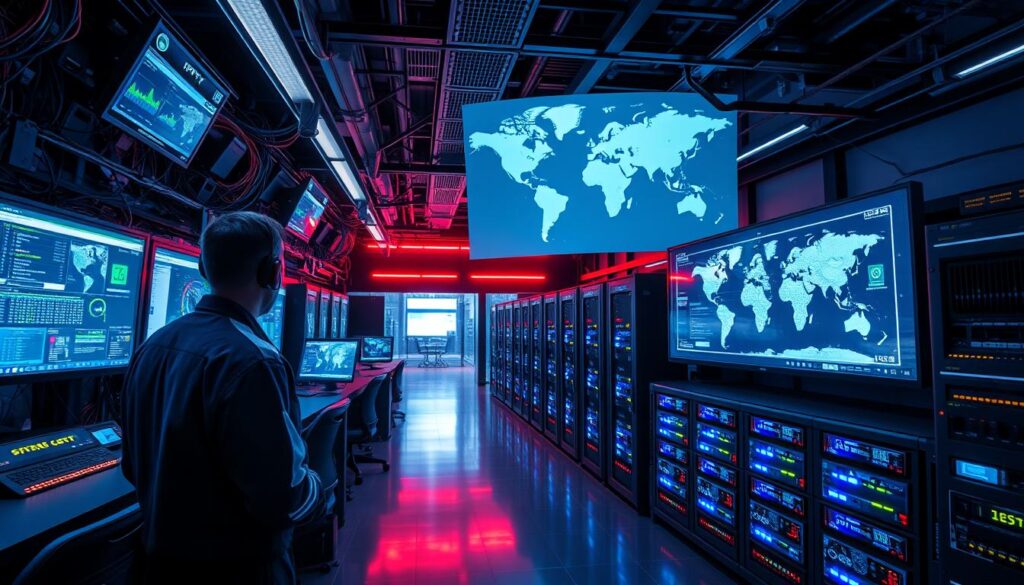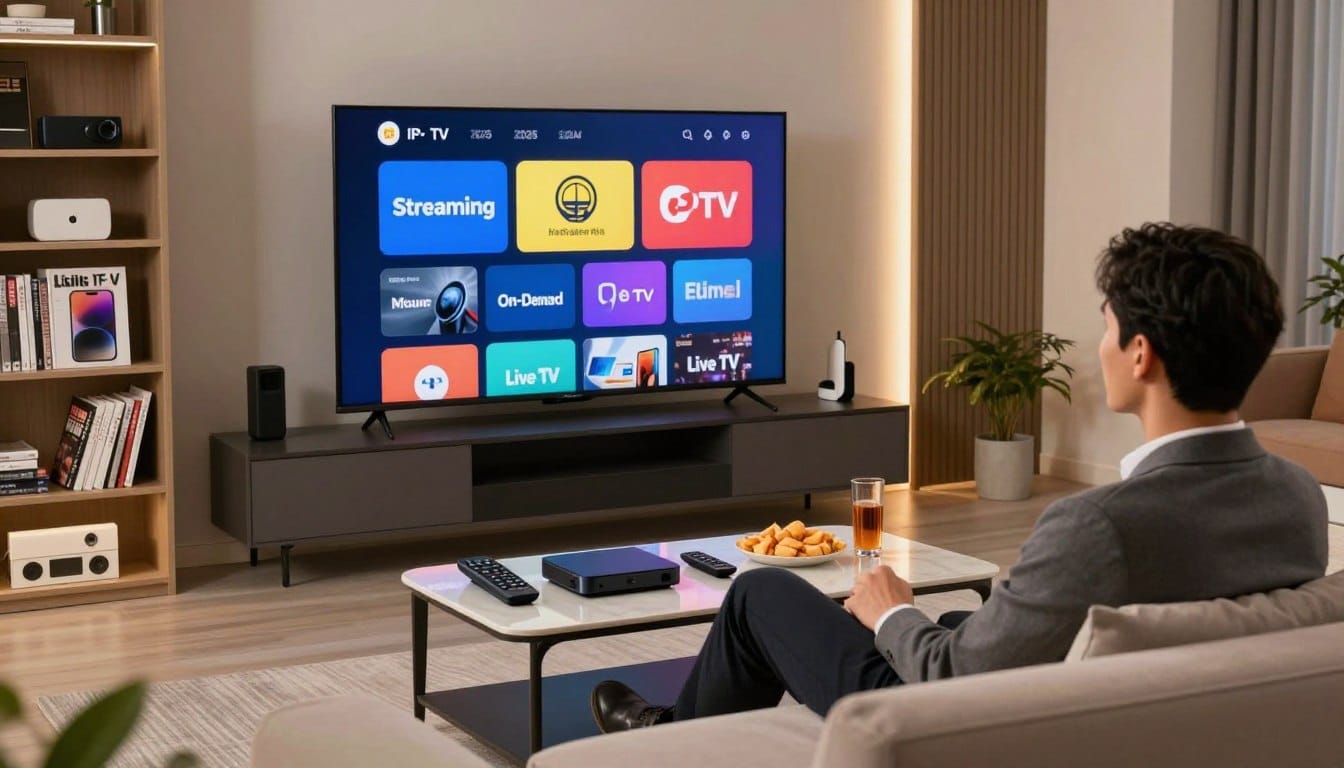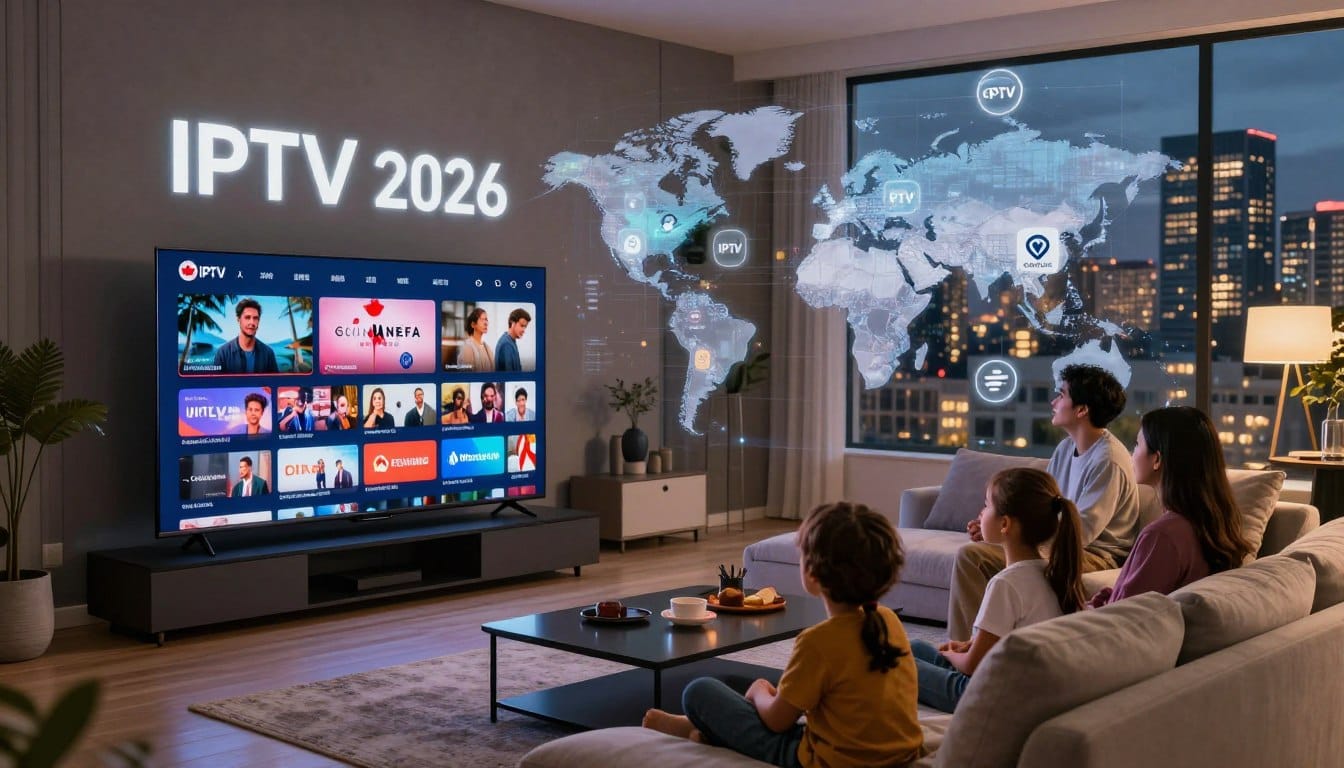When it comes to home entertainment, the debate between IPTV and traditional Cable TV has been ongoing. With the rise of streaming services, viewers are now presented with a multitude of options to choose from, each with its unique features and benefits.
The way we consume television has undergone a significant transformation, with viewing preferences shifting towards more personalized and flexible entertainment solutions. As we explore the world of home entertainment, it’s essential to weigh the pros and cons of each option.
Key Takeaways
- IPTV offers a more personalized viewing experience.
- Cable TV provides a broader range of channels.
- Home entertainment options are evolving rapidly.
- Viewing preferences are shifting towards streaming services.
- The debate between IPTV and Cable TV is ongoing.
What You Need to Know About IPTV and Cable TV
Television content delivery has evolved significantly over the years, with IPTV and Cable TV emerging as two prominent options. This evolution has transformed the way we consume television content, offering a range of choices for home entertainment.
The Evolution of Television Content Delivery
The television landscape has undergone a significant transformation since the advent of Cable TV in the 20th century. Initially, Cable TV revolutionized content delivery by offering a wider range of channels and better reception quality compared to traditional broadcasting. With the advancement of technology, IPTV emerged as a new method of delivering television content through internet protocols. This shift has enabled more flexibility and personalized viewing experiences.
Key milestones in this evolution include:
- The introduction of Cable TV, which expanded channel options and improved signal quality.
- The development of digital Cable TV, enhancing picture and sound quality.
- The emergence of IPTV, allowing for content delivery over the internet.

Key Differences at a Glance
When comparing IPTV and Cable TV, several key differences become apparent. IPTV delivers content over the internet, allowing for greater flexibility and the ability to watch on multiple devices. Cable TV, on the other hand, relies on a traditional broadcasting infrastructure, offering a more stable and consistent viewing experience.
Main differences include:
- Content Delivery Method: IPTV uses internet protocol, while Cable TV uses traditional broadcasting.
- Flexibility: IPTV allows viewing on multiple devices, whereas Cable TV is generally limited to TV sets with a cable connection.
- Reliability: Cable TV is often considered more reliable due to its dedicated infrastructure.
IPTV vs Cable TV: Understanding the Technology
Understanding the technology behind IPTV and Cable TV is crucial for making an informed decision about your home entertainment needs. The technological infrastructure of these services plays a significant role in determining the quality and reliability of the viewing experience.
How IPTV Delivers Content Through Internet Protocol
IPTV, or Internet Protocol Television, uses the internet to deliver content to your home. This is achieved through streaming technology, which breaks down video content into data packets that are transmitted over the internet. These packets are then reassembled by your device, allowing for a seamless viewing experience.
Streaming Technology and Data Transmission
The efficiency of IPTV’s streaming technology depends on the quality of your internet connection. A stable and fast internet connection ensures that data packets are transmitted smoothly, resulting in high-quality video playback. As noted by a leading industry expert, “The future of television lies in IP-based streaming solutions.” This underscores the importance of a robust internet infrastructure for IPTV services.
Server-Based Content Distribution
IPTV services rely on server-based content distribution, where content is stored on remote servers and accessed via the internet. This allows for a wide range of content to be made available, as servers can be easily updated with new programming. The use of server-based distribution also enables features like video-on-demand and catch-up TV.

Cable TV’s Traditional Broadcasting Infrastructure
Cable TV, on the other hand, uses a traditional broadcasting infrastructure that is separate from the internet. This involves a network of coaxial cables that transmit television signals directly to your home.
Coaxial Cable Networks
The coaxial cable network is the backbone of Cable TV’s infrastructure. These cables are designed to carry high-frequency signals over long distances without significant degradation. This ensures that Cable TV can provide a reliable and consistent viewing experience.
Signal Transmission Methods
Cable TV uses signal transmission methods that are optimized for broadcasting television content. The signals are transmitted through the coaxial cables to a tuner in your TV or cable box, which decodes the signal and displays the content. As a report by a media research firm states, “
Cable TV remains a dominant force in the television landscape due to its reliable signal transmission and wide availability.
” This highlights the strengths of Cable TV’s traditional infrastructure.
In conclusion, the technological differences between IPTV and Cable TV are significant. IPTV relies on internet protocol and streaming technology, while Cable TV uses a traditional broadcasting infrastructure based on coaxial cables and signal transmission methods. Understanding these differences is key to choosing the best service for your home entertainment needs.
Comparing Costs: IPTV and Cable TV in Canada
When it comes to choosing between IPTV and Cable TV in Canada, one of the most critical factors to consider is the cost. The financial implications of selecting one service over the other can be significant, and understanding these costs is essential for making an informed decision.
Canadian IPTV Service Pricing Models
IPTV services in Canada offer various pricing models to cater to different consumer needs. These models often depend on the range of channels and content offered.
Popular Canadian IPTV Providers and Their Rates
Some of the popular IPTV providers in Canada include IPTV-Smarter, DAZN, and Netflix (though Netflix is primarily a streaming service, it’s often considered alongside IPTV). Their rates vary, with basic packages starting as low as $10-$20 CAD per month, and more comprehensive packages costing upwards of $50-$70 CAD per month.
Subscription Flexibility and Contract Options
One of the advantages of IPTV services is their flexibility. Many providers offer month-to-month subscriptions without long-term contracts, allowing consumers to change or cancel their service at any time. This flexibility is particularly appealing to those who wish to avoid being locked into a contract.
Cable TV Packages and Pricing in Canada
Cable TV providers in Canada also offer a range of packages at different price points, often bundling TV with internet and phone services.
Major Canadian Cable Providers and Their Offerings
Major Cable TV providers include Rogers, Bell, and Telus. Their basic TV packages can start around $20-$30 CAD per month, but more comprehensive packages with additional channels and features can cost $100 CAD or more per month.
Bundle Deals and Long-Term Commitments
Cable TV providers often offer discounts for bundling services together and for committing to longer-term contracts. While these deals can reduce the monthly cost, they may also come with penalties for early cancellation.

Content Selection and Programming Variety
For many viewers, the decision between IPTV and Cable TV hinges on the availability of their favorite channels and shows. The content offered by these services can significantly impact the viewing experience.
What You Can Watch on IPTV Services
IPTV services have gained popularity due to their diverse content offerings. Viewers can access a wide range of channels and on-demand content.
International and Specialty Channels
One of the standout features of IPTV is its ability to offer international and specialty channels that cater to diverse audiences. Whether you’re interested in Asian dramas, European sports, or niche educational programs, IPTV services often have something for everyone.
On-Demand Libraries and Content Customization
IPTV platforms typically provide extensive on-demand libraries, allowing users to watch their favorite shows and movies at their convenience. Moreover, many IPTV services offer content customization options, enabling viewers to personalize their viewing experience by creating watchlists or receiving recommendations based on their viewing history.
Cable TV’s Channel Lineups and Programming
Cable TV has long been a staple in home entertainment, offering a variety of channel lineups that include local programming, premium channels, and sports packages.
Canadian Content and Local Programming
Cable TV providers in Canada ensure that their channel lineups include Canadian content and local programming, which is essential for viewers who want to stay updated on local news, events, and sports.
Premium Channels and Sports Packages
In addition to standard channel lineups, Cable TV services offer premium channels and sports packages that provide access to exclusive content, including movies, original series, and live sports events. These packages cater to different interests and viewing preferences.
Both IPTV and Cable TV offer a range of content options, but the choice between them depends on individual preferences regarding channel variety, on-demand content, and customization.
Picture Quality and Viewing Experience Comparison
Picture quality and reliability are key considerations when choosing between IPTV and Cable TV for home entertainment. Both services have their strengths and weaknesses in delivering a high-quality viewing experience.
IPTV Resolution Options and Streaming Quality
IPTV services offer a range of resolution options, including HD and 4K content, depending on the provider and the quality of the internet connection. The streaming quality is generally consistent, provided the internet speed is sufficient.
4K Content Availability and Requirements
Many IPTV services now offer 4K content, which requires a fast internet connection, typically above 25 Mbps. Ensuring a stable and fast connection is crucial for uninterrupted 4K streaming.
Handling Peak Viewing Times
During peak viewing times, IPTV services can sometimes experience buffering or reduced quality due to network congestion. However, many providers are investing in infrastructure to mitigate this issue.
Cable TV’s Reliability and Picture Consistency
Cable TV is known for its reliable picture quality, with consistent delivery of HD and Ultra HD content. The quality is generally not affected by internet congestion.
HD and Ultra HD Options
Cable TV providers offer a variety of HD and Ultra HD channels, providing viewers with high-quality visuals. The availability of these channels can vary depending on the cable package.
Weather Impact and Service Interruptions
One of the drawbacks of Cable TV is its susceptibility to weather-related service interruptions. Severe weather conditions can cause signal loss or degradation.
In conclusion, both IPTV and Cable TV have their advantages and disadvantages when it comes to picture quality and viewing experience. IPTV offers flexibility and a range of resolution options, but its quality can be affected by internet speed and network congestion. Cable TV, on the other hand, provides reliable picture quality but may be impacted by weather conditions.
Flexibility and Device Compatibility
As viewers increasingly demand more flexibility in how they consume television content, the device compatibility of IPTV and Cable TV becomes a crucial factor. The ability to watch content on multiple devices, including smartphones, tablets, smart TVs, and streaming devices, is essential for a satisfying viewing experience.
How IPTV Works Across Multiple Devices
IPTV services are designed to be highly flexible, allowing users to watch their favorite shows on a variety of devices. This flexibility is one of the significant advantages of IPTV over traditional Cable TV.
Mobile Viewing Options
With IPTV, users can enjoy their favorite channels and on-demand content on their mobile devices, whether it’s a smartphone or a tablet. This is particularly useful for those who are always on the go and want to stay entertained.
Smart TV and Streaming Device Integration
IPTV services are also compatible with a range of smart TVs and streaming devices, such as Roku, Amazon Fire TV, and Google Chromecast. This compatibility ensures that users can access their IPTV service directly through these devices, enhancing their viewing experience.
Cable TV’s Equipment Requirements
In contrast, Cable TV typically requires specific equipment to function, which can limit its flexibility compared to IPTV.
Set-Top Box Limitations
Cable TV often necessitates the use of a set-top box, which can be a limitation for some users. These boxes are usually provided by the cable company and can restrict the flexibility of viewing on multiple devices within the home.
Multi-Room Viewing Solutions
However, some Cable TV providers offer multi-room viewing solutions, which allow users to watch different channels in different rooms. While this is a useful feature, it still doesn’t match the device flexibility offered by IPTV.
| Feature | IPTV | Cable TV |
|---|---|---|
| Mobile Viewing | Supported | Limited |
| Smart TV Compatibility | Yes | Yes, with set-top box |
| Multi-Room Viewing | Available with some providers | Yes, with additional equipment |
Setup and Installation Requirements
Before diving into the world of IPTV and Cable TV, it’s crucial to understand their setup and installation requirements. Both services have unique needs that can impact your viewing experience.
Getting Started with IPTV Services
To start using IPTV services, you need a stable internet connection. This ensures that your streaming is smooth and uninterrupted.
Internet Connection Requirements
A minimum internet speed of 25 Mbps is recommended for HD streaming, though this can vary depending on the provider. Ensuring your internet plan meets this requirement is crucial.
Software and App Setup
Most IPTV services require downloading their app or software. This is usually straightforward and can be done on various devices, including smart TVs and mobile devices.
Cable TV Installation Process
Cable TV installation involves connecting your TV to the cable network. This can be done through professional installation or self-installation kits.
Professional Installation vs. Self-Installation
Professional installation offers a hassle-free experience, while self-installation can be cost-effective. The choice depends on your comfort with technology and installation processes.
Equipment and Wiring Needs
You will need a cable box and potentially additional wiring, depending on your home’s existing infrastructure. This can sometimes require adjustments to your home’s wiring.
| Feature | IPTV | Cable TV |
|---|---|---|
| Internet Requirement | Yes | No |
| Installation Type | Self-Installation | Professional/Self-Installation |
| Equipment Needed | Device with Internet | Cable Box, Wiring |
Internet Bandwidth and Connectivity Considerations
The choice between IPTV and Cable TV hinges significantly on their respective dependencies on internet connectivity. Understanding how each service interacts with internet bandwidth is crucial for making an informed decision.
IPTV’s Dependence on Internet Quality
IPTV services rely heavily on the quality of your internet connection. A stable and fast internet connection is essential for uninterrupted streaming.
Minimum Speed Requirements
For a smooth IPTV experience, a minimum internet speed of 25 Mbps is recommended for standard definition streaming, while 50 Mbps or more is suggested for high-definition content. Ensuring your internet plan meets these requirements is vital.
Managing Bandwidth Usage
To manage bandwidth usage effectively, consider the following strategies:
- Limit the number of devices streaming simultaneously.
- Adjust the streaming quality based on your internet plan.
- Use a wired connection for critical devices.
How Cable TV Operates Independently from Internet
Cable TV, on the other hand, operates independently of your internet connection, using a dedicated infrastructure for broadcasting television channels.
Benefits During Internet Outages
One of the significant advantages of Cable TV is its ability to function even during internet outages, ensuring that you remain connected to your favorite TV shows and channels without interruption.
Combined Internet and Cable Services
Many Cable TV providers also offer internet services, allowing for bundled packages that can simplify your billing and potentially offer cost savings. However, it’s essential to assess whether these bundles meet your specific needs.
In conclusion, when choosing between IPTV and Cable TV, it’s essential to consider your internet bandwidth and connectivity. IPTV requires a robust internet connection, while Cable TV operates independently, offering a different set of advantages.
Which Option Suits Different Viewing Preferences?
Your viewing preferences play a crucial role in deciding between IPTV and Cable TV. Different viewers have different needs, and understanding these needs is key to making an informed decision.
Ideal Scenarios for Choosing IPTV
IPTV is particularly suited for certain types of viewers. For instance, those who value flexibility and a wide range of content options may find IPTV to be the better choice.
For Tech-Savvy Cord-Cutters
Tech-savvy individuals who are accustomed to streaming content on various devices may prefer IPTV. It offers the flexibility to watch TV on multiple devices, including smartphones, tablets, and smart TVs. IPTV services often come with features like pause, rewind, and record live TV, enhancing the viewing experience.
For International Content Enthusiasts
Viewers interested in international content will find IPTV particularly appealing. IPTV services often provide access to a vast array of international channels and on-demand content, catering to diverse tastes. This is especially beneficial for expatriates or those interested in global news and entertainment.
When Cable TV Remains the Better Choice
Despite the advantages of IPTV, Cable TV remains a viable option for certain viewers. Those who prioritize reliability and bundled services may find Cable TV more suitable.
For Reliability-Focused Viewers
Viewers who value reliability and consistent picture quality may prefer Cable TV. Cable TV operates on a dedicated infrastructure, ensuring a stable connection and high-quality viewing experience. Cable TV is less susceptible to buffering and quality issues associated with internet connectivity.
For Bundled Service Preferences
Consumers who prefer bundled services, including TV, internet, and phone, may find Cable TV providers offering more comprehensive packages. Bundling services can often result in cost savings and the convenience of having multiple services managed by a single provider.
In conclusion, the choice between IPTV and Cable TV should be based on individual viewing preferences and needs. By considering factors such as flexibility, content variety, reliability, and bundled services, viewers can make an informed decision that best suits their lifestyle.
Conclusion: Making Your Decision Between IPTV and Cable TV
Choosing between IPTV and Cable TV for your home entertainment needs depends on several key factors, including your viewing habits, budget, and the level of flexibility you require.
IPTV services offer a modern, flexible alternative to traditional Cable TV, with the ability to stream content across multiple devices and a range of pricing models to suit different budgets.
When deciding between IPTV and Cable TV, consider the type of content you watch most often and whether the services available in your area meet your needs.
If you value the ability to watch on-demand content and don’t mind relying on a stable internet connection, IPTV might be the best choice for you.
On the other hand, if you prefer a more traditional viewing experience with live TV and don’t want to worry about internet bandwidth, Cable TV remains a reliable option.
Ultimately, the decision comes down to your individual viewing habits and what you prioritize in a home entertainment service.
FAQ
What is the main difference between IPTV and Cable TV?
The primary difference lies in how they deliver television content. IPTV uses internet protocol over a broadband connection, while Cable TV relies on a traditional coaxial cable infrastructure.
Can I watch IPTV on multiple devices?
Yes, one of the advantages of IPTV is its ability to stream content across various devices, including smartphones, tablets, smart TVs, and streaming devices, provided you have a stable internet connection.
Is Cable TV more reliable than IPTV?
Cable TV is generally considered more reliable as it operates independently of internet connectivity. However, its reliability can be affected by physical factors like weather conditions.
Do I need a fast internet connection for IPTV?
Yes, IPTV requires a stable and sufficiently fast internet connection to stream content without buffering or interruption. The minimum speed required can vary depending on the quality of the content being streamed.
Can I get 4K content on IPTV?
Many IPTV services offer 4K content, but the availability can depend on the provider and your internet connection’s bandwidth. A fast and stable internet connection is necessary to stream 4K content smoothly.
How does Cable TV handle peak viewing times?
Cable TV’s infrastructure is designed to handle peak viewing times without a significant drop in picture quality. However, IPTV services can sometimes suffer from buffering during peak times if the internet connection is not robust enough.
Are there any additional costs associated with IPTV or Cable TV?
Both services can have additional costs. For IPTV, you might need to pay for higher internet bandwidth. For Cable TV, there could be costs for equipment rental, premium channels, or bundle packages.
Can I customize my viewing experience with IPTV?
Yes, IPTV services often allow for a more personalized viewing experience, with options to choose specific channels or on-demand content that suits your preferences.
What are the benefits of choosing Cable TV over IPTV?
Cable TV offers reliability, consistent picture quality, and the ability to watch TV without relying on internet connectivity. It’s also a good option for those who prefer traditional broadcasting methods and bundled services.
How do I decide between IPTV and Cable TV?
Your choice should be based on your viewing habits, the importance of reliability, the need for on-demand content, device compatibility, and your internet connection’s quality. Consider what’s most important to you in a home entertainment solution.




